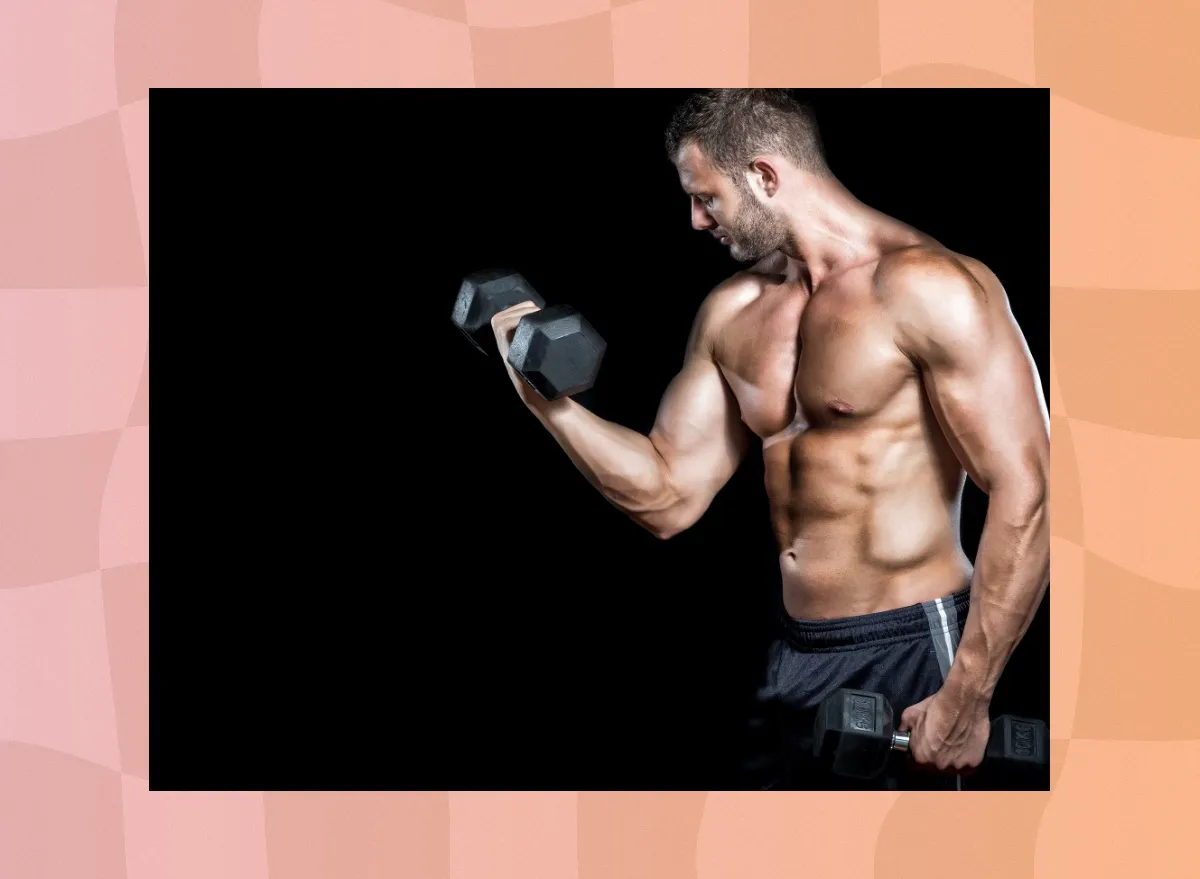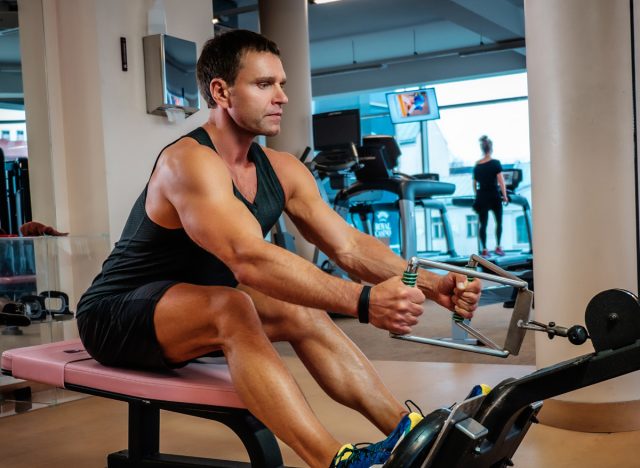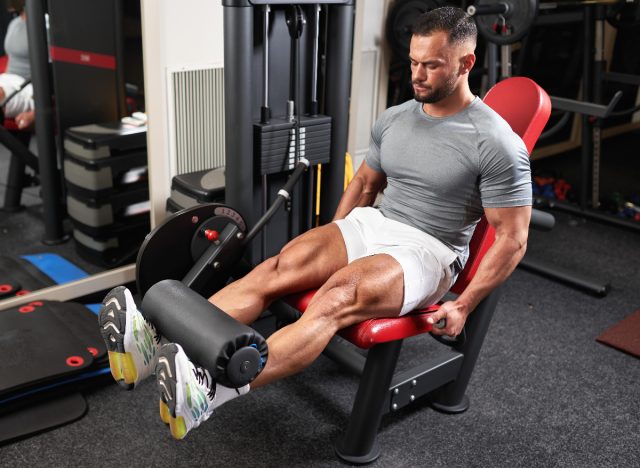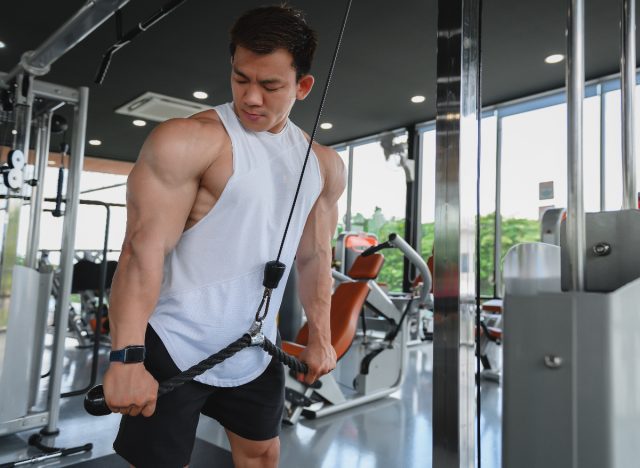How To Use Fascia Stretch Training (FST-7) to Get Bigger Muscles

If you haven't tried fascia stretch training (FST-7) before, you've been missing out on a potentially seriously beneficial method for muscle growth. FST-7 was developed by bodybuilding coach Hany Rambod, a 24-time Olympia-winning coach and seven-time Mr. Olympia, to stretch out the fascia (the connective tissue encompassing your muscles), which aids in muscle growth and definition.
"In the simplest sense, FST-7 is basically a way to help someone build more muscle than their body would otherwise allow them to for structural reasons. This matters most for people who are already near their genetic limit [regarding how much] muscle they can build," explains Domenic Angelino, CPT at Trainer Academy. "Fascia stretch training specifically helps you target fascia as a limiting factor in an effort to reduce its ability to limit how much muscle you can build."
Angelino points out that although FST-7 may not be as impactful for someone at a beginner level, it can still be worth a shot. "You're still lifting weight at a high volume," he says. "That drives muscle growth in general for a whole host of other reasons, including hormonal."
If you're eager to learn more about FST-7, fitness pros explain how to use it to build bigger muscles. Continue reading to learn more.
How to perform FST-7:

FST-7 is all about focusing on your end goal. "You need to perform a lot of sets at the end of your workout of one exercise to help pump up the muscle as much as possible," Angelino tells us. To "pump up" your target muscle, you can complete seven sets within a moderate to high rep range at the end of your session.
FST-7 typically consists of wrapping up your workout with two to three exercises that can be completed with minimal injury risk due to muscle failure, explains Jordan Fernandez, CPT at Trainer Academy. Some examples include lat pulldowns, tricep extensions, and bicep curls. Performing exercises with a "weight drop risk," such as barbell bench presses and squats, is not recommended.
How can FST-7 help you build bigger muscles?

While your muscle fills with blood and its resting tension rises, it gets bigger and presses against the fascia. "The idea is that this natural mechanical interaction will result in the fascia [stretching, allowing] for more room for actual muscle to be built," Angelino tells us. "Independent of this, you'll also experience a hyper-localized hormonal and metabolic response [that will] help your body build muscle in that area. The interaction of these two factors can explain why some people have found success with this training method: You give a target muscle more room to grow while simultaneously giving that muscle a specific reason to grow."
If you decide to test out FST-7, Angelino stresses to ensure your pump is as big as possible. That being said, curating your overall workout to best encourage your end goal is crucial.
"The most straightforward way to increase your pump is by simply performing a lot of exercises targeting the same muscle back to back," he says. "If you're aiming to perform fascia stretch training for your biceps, make sure that you perform plenty of biceps work [before] that final exercise of seven sets."
You may also find it helpful to do your heavier sets at the beginning of the workout, as this can aid in motor unit recruitment. "This will prime the associated muscle fibers so that they more readily get involved in sets later in the workout, which can help with increasing the pump," Angelino explains.
In addition, if your workout engages multiple muscle groups, complete your "seven sets" when you wrap up each muscle group rather than at the end of the entire workout. Angelino offers, "So if you're training your biceps and triceps and want to use FST-7 on both, do all your bicep work, a bicep exercise for seven sets, all your tricep work, and then finally a tricep exercise for seven sets."
Sample FST-7 workouts for muscle growth:

Angelino provides several sample workouts that address common major muscle groups. Be mindful that this approach typically works well for more advanced lifters.
Chest:
- Dumbbell Bench Press (4 sets of 8 reps)
- Weighted Wide Grip Chest Dip (4 sets of 10 reps)
- Low-to-High Cable Chest Flyes (4 sets of 12 reps)
- Smith Machine Bench Press (7 sets of 12 reps)
Back:
- Weighted Wide Grip Pull-up (4 sets of 8 reps)
- Weighted Neutral Grip Pull-up (4 sets of 10 reps)
- Dumbbell One-arm Row (4 sets of 12 reps)
- Cable Seated Row (7 sets of 12 reps)
Shoulders:
- Dumbbell Overhead Press (4 sets of 8 reps)
- Dumbbell Front Raise (4 sets of 10 reps)
- Dumbbell Lateral Raise (4 sets of 12 reps)
- Dumbbell Arnold Press (7 sets of 12 reps)
Biceps:
- Dumbbell Bicep Curls (4 sets of 8 reps)
- Dumbbell Hammer Curls (4 sets of 10 reps)
- Dumbbell Preacher Curls (4 sets of 12 reps)
- Cable Curls (7 sets of 12 reps)
Triceps:
- Dumbbell Overhead Tricep Extension (4 sets of 8 reps)
- Dumbbell Skull Crusher (4 sets of 10 reps)
- Cable Overhead Rope Tricep Extension (4 sets of 12 reps)
- Cable Tricep Pushdown (7 sets of 12 reps)
Quadriceps
- Dumbbell Goblet Squat (4 sets of 8 reps)
- Dumbbell Weighted Step-up (4 sets of 10 reps)
- Leg Press (4 sets of 12 reps)
- Leg Extension (7 sets of 12 reps)
Hamstrings:
- Barbell Snatch Grip Romanian Deadlift (4 sets of 8 reps)
- Dumbbell Romanian Deadlift (4 sets of 10 reps)
- Weighted Glute Ham Raise (4 sets of 12 reps)
- Seated Leg Curl (7 sets of 12 reps)
Abs
- Overhead Hanging Straight-leg Raise (4 sets of 8 reps)
- Overhead Hanging Oblique Twist (4 sets of 10 reps)
- Ab Wheel Rollout (4 sets of 12 reps)
- Weighted Decline Crunches (7 sets of 12 reps)









